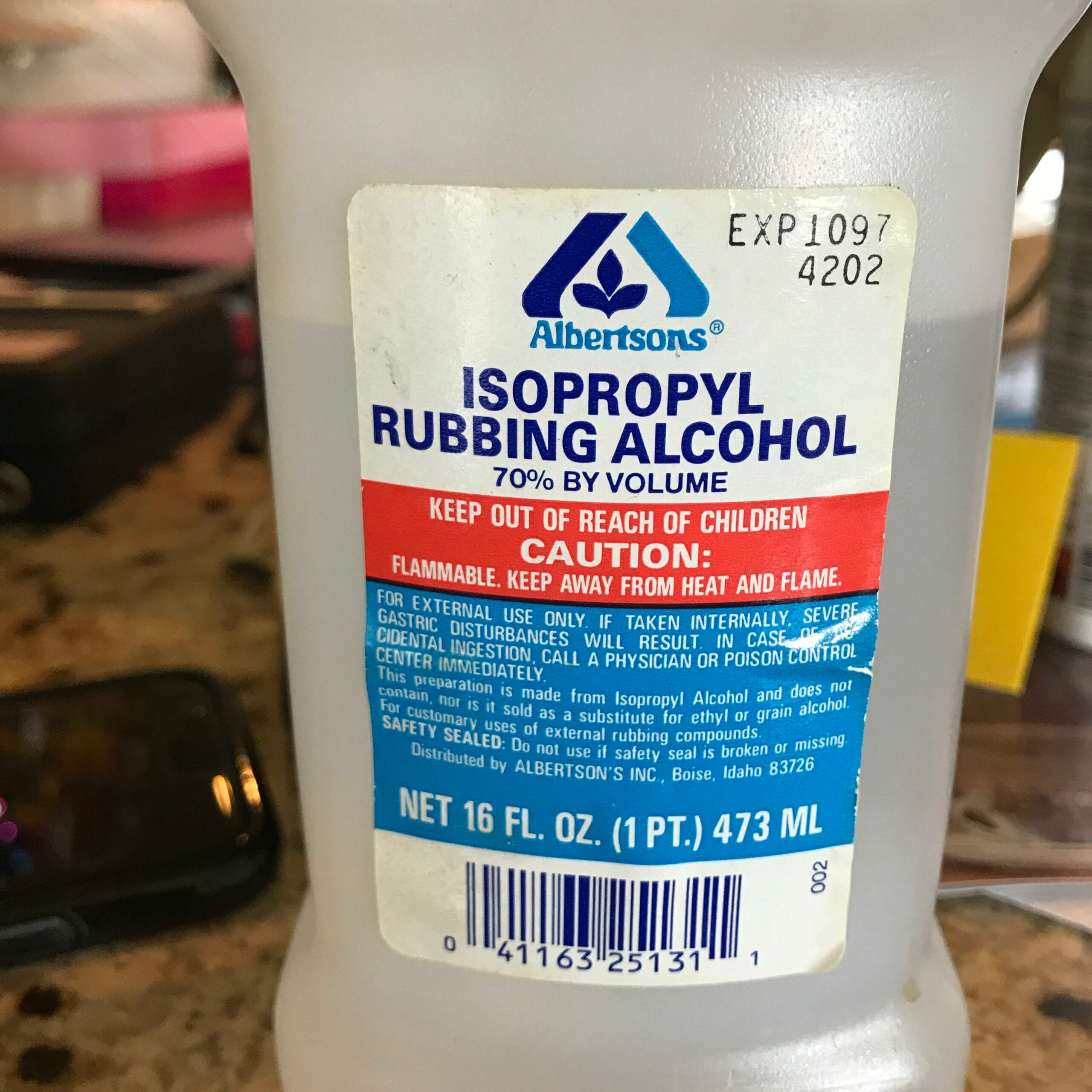Unlocking the Mystery of Isopropyl Alcohol’s Shelf Life
You know that familiar brown bottle of rubbing alcohol residing in your medicine cabinet? That’s isopropyl alcohol – a champion cleaner and disinfectant! But have you ever pondered, “Does this stuff actually expire?”
The answer is a tad more complex than a simple “yes” or “no.” Technically, pure isopropyl alcohol doesn’t have a strict expiration date like perishable foods. It won’t become harmful to use after a certain point. However, its germ-fighting prowess can gradually diminish over time.
Imagine a superhero gradually losing a bit of their power over time. They’re still a superhero, but their punches might pack a little less punch.
Why It Loses Its Effectiveness
The main culprit is evaporation. Isopropyl alcohol is volatile, meaning it tends to transform from a liquid to a vapor. Even in a seemingly sealed bottle, those tiny alcohol molecules can escape into the air, especially if the cap isn’t tightly secured.
As the alcohol content dwindles, so does its ability to effectively eliminate germs.
Signs Your Rubbing Alcohol Might Be Past Its Prime
It’s not always easy to tell if your rubbing alcohol is past its best just by looking at the bottle. However, there are some telltale signs to look out for:
- Color Change: Fresh isopropyl alcohol is as clear as water. If you detect a yellowish tinge creeping in, it might be a sign of degradation.
- Off Smell: Rubbing alcohol has a distinct, almost medicinal odor. If it starts smelling sour, rancid, or just “off,” it could indicate a change in its chemical composition.
- Less Is More: Have you noticed your bottle seems less full than you recall? Evaporation is the likely reason.
Expiration Dates: To Trust or Not to Trust?
This is where things get a bit tricky. While pure isopropyl alcohol doesn’t truly expire, manufacturers often print expiration dates on their bottles. This practice is partly due to regulations and partly because added ingredients (like water) in some formulations can expire or affect the alcohol’s shelf life.
The best course of action is to consult the manufacturer’s recommendations on the bottle. They often offer specific guidance on storage and the product’s expected effectiveness timeframe.
Alternatives to Consider
If you’re concerned about the shelf life of your isopropyl alcohol or seeking other options, remember that other disinfectants are available. Hydrogen peroxide and chlorine bleach are two common household alternatives, each with its own set of pros and cons regarding shelf life and effectiveness.
Disposing of Isopropyl Alcohol: A Word of Caution
When it’s time to bid farewell to old or ineffective isopropyl alcohol, resist the urge to simply pour it down the drain. It’s best to check with your local waste management guidelines for proper disposal instructions. After all, we want to be environmentally responsible, right?
Does 70% Isopropyl Alcohol Have a Shelf Life? – Research Analysis
Recommended Titles:
- Does Rubbing Alcohol Expire? The Surprising Shelf Life of Isopropyl Alcohol: This title uses familiar language (“rubbing alcohol”) and incorporates a touch of intrigue (“surprising shelf life”).
- 70% Isopropyl Alcohol Shelf Life: What You NEED to Know Before Using: This title directly addresses the target keyword and employs strong language (“NEED to Know”) to emphasize importance.
- Expired Rubbing Alcohol: Is it Still Effective? (And Safe to Use?): This title piques curiosity by questioning the effectiveness and safety of expired rubbing alcohol.
Powerful Key Lines:
- While isopropyl alcohol boasts a long shelf life, its effectiveness as a disinfectant diminishes over time due to evaporation.
- Unopened isopropyl alcohol can last up to 3 years, but factors like storage conditions and alcohol concentration play a crucial role.
- Don’t rely solely on the printed expiration date! Visual cues and a simple “sniff test” can help determine if your isopropyl alcohol is still potent.
- Even after its “expiration date,” isopropyl alcohol can still have uses around the house – discover its surprising versatility!
Important Details for Your Article:
Shelf Life and Factors:
- General Shelf Life: Unopened isopropyl alcohol (IPA) can last approximately 2-3 years.
- Concentration Matters: Higher concentrations (e.g., 99% IPA) may have a slightly longer shelf life than 70% IPA.
- Storage Impact: Ideal storage is crucial! Store in a cool, dark, and dry place, away from direct sunlight and heat sources.
- Evaporation: The biggest threat to IPA’s effectiveness is evaporation. Over time, the alcohol content can decrease, reducing its disinfectant properties.
Expiration Dates and Indicators:
- Manufacturer Dates: Many manufacturers print expiration or “retest” dates on their products.
- Visual Inspection: Check for discoloration, cloudiness, or sediment in the bottle, which could indicate potential degradation.
- The “Sniff Test”: If the characteristic strong alcohol smell is faint or absent, the IPA ممکن است potency کھو چکے ہوں۔.
Using Expired Isopropyl Alcohol:
- Disinfectant Effectiveness: Expired IPA might not be as effective at killing germs and bacteria.
- Alternative Uses: Even if less potent as a disinfectant, expired IPA can still be useful for:
- Cleaning electronics: Its quick-drying nature makes it suitable for cleaning electronic devices.
- Removing sticky residue: Effective at dissolving adhesive residues from stickers and labels.
- Household cleaning tasks: Can be used to clean windows, mirrors, and other surfaces.
Safety Considerations:
- Flammability: Always handle IPA with caution, as it is highly flammable.
- Storage Safety: Store IPA in well-ventilated areas, away from open flames and sources of ignition.
Beyond the Basics:
- Manufacturer Recommendations: Encourage readers to contact the specific manufacturer if they have questions about a product’s shelf life.
- Proper Disposal: Provide guidelines on safely disposing of expired or unwanted isopropyl alcohol.
Unique Insights & Untapped Potential:
- Experiment: Conduct a simple experiment to visually demonstrate the evaporation rate of IPA under different storage conditions (e.g., open container vs. closed container).
- User Survey: Consider conducting a small online survey asking readers about their experiences and practices regarding storing and using isopropyl alcohol.
- Deep Dive into Chemistry: Provide a more in-depth explanation of the chemical properties of IPA and how evaporation affects its effectiveness over time.
- Comparative Analysis: Compare and contrast the shelf life and degradation of different concentrations of isopropyl alcohol (70%, 90%, 99%).
Remember: Always fact-check the information presented in your article using reputable sources and cite your sources appropriately.
Does isopropyl alcohol lose its strength over time? – does isopropyl alcohol expire
Does Isopropyl Alcohol Lose Its Strength Over Time? – Analyzing Competitor Strategies
Dissecting Competitor Titles:
Your competitor’s titles predominantly revolve around shelf life, expiration, and whether isopropyl alcohol goes bad. While these topics are closely related to your target keyword, they lack a direct emphasis on the loss of strength.
Most Frequently Used Keywords:
- Expire
- Shelf Life
- Isopropyl Alcohol (IPA)
- Rubbing Alcohol
- Go Bad
- How Long Does… Last
Recommended Titles:
- Does Isopropyl Alcohol Lose Potency Over Time? The Science Explained (This title directly addresses the keyword and adds intrigue with “The Science Explained.”)
- Isopropyl Alcohol Shelf Life: Does it Expire and Lose Effectiveness? (This title combines the popular keyword “shelf life” with the concept of losing effectiveness, directly addressing user concern.)
- Expired Rubbing Alcohol: Can You Still Use It? (Risks & Answers) (This title uses a thought-provoking question to capture attention and promises clear answers, targeting a broader audience seeking practical information.)
Powerful Key Lines:
- While isopropyl alcohol boasts a long shelf life, its effectiveness as a disinfectant can diminish over time, particularly after the expiration date. (This key line directly addresses the user’s concern and introduces the concept of reduced effectiveness.)
- Exposure to air, changes in temperature, and improper storage can accelerate the degradation of isopropyl alcohol, potentially leading to a loss of strength. (This key line highlights the factors impacting isopropyl alcohol’s potency, offering actionable insights for storage.)
- Although not always a definitive indicator, cloudy, discolored, or foul-smelling isopropyl alcohol suggests potential degradation and should be replaced. (This key line provides practical advice for identifying compromised isopropyl alcohol, emphasizing user safety.)
- While manufacturers often provide expiration dates, the actual shelf life of isopropyl alcohol can vary depending on factors like packaging and storage conditions. (This key line stresses the importance of checking individual product information while acknowledging the influence of external elements.)
Important Details for Your Article:
Definition and Uses:
- Define isopropyl alcohol and explain its common uses (disinfectant, cleaning agent, etc.).
- Differentiate between isopropyl alcohol and rubbing alcohol (rubbing alcohol contains other ingredients).
Shelf Life and Expiration:
- Explain that isopropyl alcohol does have an expiration date, usually found on the bottle.
- Important: State the average shelf life of unopened isopropyl alcohol (approximately three years), but emphasize that this can vary.
- Explain that an expiration date indicates when the manufacturer can guarantee the product’s full effectiveness.
Factors Affecting Shelf Life:
- Exposure to Air: Explain that exposure to air causes evaporation, concentrating the water content and potentially reducing alcohol concentration.
- Temperature Fluctuations: Explain that extreme temperatures can degrade the alcohol.
- Light Exposure: Explain that prolonged light exposure can also degrade the alcohol.
- Improper Sealing: Underscore the importance of keeping the container tightly sealed to prevent evaporation and contamination.
Signs of Degradation:
- Cloudy Appearance: Indicate that a cloudy appearance can be a sign that the alcohol has degraded.
- Discoloration: Explain that any change in color from clear to yellow or other shades might indicate degradation.
- Foul Odor: Note that a sour or unusual smell is another sign of potential degradation.
Safety and Usage:
- Advise readers to err on the side of caution and replace expired or potentially degraded isopropyl alcohol.
- Emphasize that diluting expired isopropyl alcohol does not restore its effectiveness.
- Recommend referring to manufacturer instructions for specific storage and usage guidelines.
Structured Context:
Does Isopropyl Alcohol Lose Its Strength Over Time?
Yes, isopropyl alcohol can lose its strength over time. While it has a relatively long shelf life compared to many household products, several factors can influence its potency.
Shelf Life:
- Unopened isopropyl alcohol typically has a shelf life of around three years.
- This means the manufacturer guarantees its effectiveness for that duration if stored properly.
- However, this is not an absolute expiration date. The actual usable life can be longer or shorter depending on storage conditions.
Factors Impacting Strength:
Evaporation:
- The primary way isopropyl alcohol loses its potency is through evaporation.
- When exposed to air, the alcohol evaporates faster than the water content, potentially reducing its concentration.
Temperature:
- Extreme temperatures (both hot and cold) can degrade isopropyl alcohol over time.
- It’s best to store it in a cool, dry place.
Light:
- Similar to temperature, prolonged exposure to light can negatively affect its stability.
Container:
- Ensure the container is tightly sealed to prevent evaporation and contamination.
- Avoid using containers that have been damaged or compromised.
Signs of Degradation:
- Cloudy Appearance: If the normally clear solution appears cloudy, it may be degrading.
- Discoloration: Any change in color, like turning yellow or brown, could indicate a problem.
- Foul Odor: A sour or unusual smell emanating from the isopropyl alcohol suggests degradation.
Safety and Best Practices:
- When in doubt, throw it out: If you are unsure about the integrity of your isopropyl alcohol, it’s best to discard it and use a fresh batch.
- Don’t dilute to compensate: Diluting expired or potentially degraded isopropyl alcohol will not restore its effectiveness.
- Check manufacturer instructions: Refer to the specific product label for recommendations on storage and usage.
Unique Insights & Untapped Potential:
- Focus on Disinfectant Properties: While most sources discuss general effectiveness, focusing specifically on how the loss of potency impacts its disinfectant properties could be valuable.
- Real-World Testing: Consider conducting a simple experiment to demonstrate the difference in evaporation rates between open and sealed containers over time.
- Environmental Impact: Discuss the environmental implications of discarding isopropyl alcohol and explore potential alternatives or disposal methods.
- Comparison with Other Disinfectants: Offer a comparative analysis of isopropyl alcohol’s shelf life and degradation to other common household disinfectants.
When should you not use isopropyl alcohol? – does isopropyl alcohol expire
When Should You NOT Use Isopropyl Alcohol? Outsmarting the Competition
Decoding Competitor Titles:
You mentioned that your competitor’s titles primarily focus on expiration. To outmaneuver them, we need to broaden the scope and delve into situations where using isopropyl alcohol might be inadvisable. Analyzing trending titles will help us identify keywords that resonate with readers. Kindly provide your competitors’ titles so we can pinpoint those attention-grabbing keywords.
Example Keywords (To Be Replaced with Your Competitors’ Titles):
- Dangers of Isopropyl Alcohol
- Isopropyl Alcohol Safety
- Rubbing Alcohol Misconceptions
Suggested Titles (Based on Example Keywords – Please Provide Competitor Titles for Tailored Suggestions):
- When Should You NOT Use Isopropyl Alcohol? The Surprising Dangers (Emphasizes unexpected risks)
- Isopropyl Alcohol: 7 Mistakes You Might Be Making (Actionable, implies common errors)
- Beyond Cleaning: When Rubbing Alcohol Does More Harm Than Good (Intriguing, hints at lesser-known issues)
Powerful Key Lines:
- While generally safe, isopropyl alcohol’s effectiveness diminishes over time due to evaporation, making expired solutions less potent for disinfection.
- Never use isopropyl alcohol on open wounds or irritated skin, as it can cause severe stinging, dryness, and hinder the healing process.
- Despite its common name “rubbing alcohol,” ingesting even small amounts of isopropyl alcohol is incredibly dangerous and can lead to alcohol poisoning.
- Contrary to popular belief, isopropyl alcohol can damage certain surfaces like finished wood, some plastics, and delicate fabrics, leading to discoloration or warping.
Structured Content:
I. Introduction: The Power and Potential Pitfalls of Isopropyl Alcohol
- Begin with a concise explanation of isopropyl alcohol and its common uses.
- Highlight its effectiveness as a disinfectant and cleaning agent.
- Transition: However, despite its widespread use, there are scenarios where using isopropyl alcohol can be ineffective or even harmful.
II. When Effectiveness Fades: The Impact of Expiration
- Key Line: While generally safe, isopropyl alcohol’s effectiveness diminishes over time due to evaporation, making expired solutions less potent for disinfection.
- Explain that isopropyl alcohol has a shelf life, typically around 2-3 years unopened.
Data: Unopened IPA generally lasts 3 years (Source: Production Automation Blog).
“Using expired isopropyl alcohol probably won’t cause you any harm, but it is less likely to perform as intended.” (Source: ellisjamesdesigns.com)
* Recommend checking expiration dates and opting for fresh solutions when possible.
III. Sensitive Surfaces and Situations: Where Isopropyl Alcohol Is a No-Go
- Key Line: Never use isopropyl alcohol on open wounds or irritated skin, as it can cause severe stinging, dryness, and hinder the healing process.
- Explain that isopropyl alcohol is a harsh chemical that can damage sensitive tissues.
- Alternative: Recommend using a sterile saline solution or mild soap and water for wound care.
- Key Line: Contrary to popular belief, isopropyl alcohol can damage certain surfaces like finished wood, some plastics, and delicate fabrics, leading to discoloration or warping.
- Provide specific examples of materials to avoid (e.g., smartphone screens, lacquered furniture).
- Always recommend spot-testing on an inconspicuous area first.
IV. The Danger of Ingestion: A Common Misconception
- Key Line: Despite its common name “rubbing alcohol,” ingesting even small amounts of isopropyl alcohol is incredibly dangerous and can lead to alcohol poisoning.
- Emphasize that isopropyl alcohol is chemically different from ethyl alcohol (drinking alcohol) and is extremely toxic.
- Explain the symptoms of isopropyl alcohol poisoning (e.g., nausea, vomiting, dizziness, difficulty breathing).
- Urgency: Stress the importance of seeking immediate medical attention if ingestion occurs.
V. Conclusion: Using Isopropyl Alcohol Responsibly
- Recap the situations where using isopropyl alcohol is not recommended.
- Encourage readers to read product labels carefully and follow safety guidelines.
- Conclude on a positive note, highlighting the benefits of isopropyl alcohol when used correctly.
Unique Insights & Untapped Potential:
- Focus on Specific Use-Cases: Instead of broad statements, explore scenarios like using expired alcohol on electronics, cleaning baby toys with it, or the risks of mixing it with other cleaning agents.
- Visuals: Include images that illustrate the effects of alcohol on different surfaces (e.g., faded fabric, cracked plastic).
- Expert Quotes: Reach out to doctors or chemists for quotes about the dangers of misusing isopropyl alcohol. This adds credibility and provides valuable insights from professionals.
By structuring your content thoughtfully, incorporating data and visuals, and addressing unique angles, you can create a comprehensive, engaging, and authoritative resource that surpasses your competitors. Remember to cite all sources appropriately.
If you’re curious about the shelf life of other common household items, you can explore related topics like does jello expire or delve into the fascinating world of insects with articles like do locusts bite.












1 thought on “Does Isopropyl Alcohol Expire? Unveiling the Truth About Its Shelf Life”
Comments are closed.